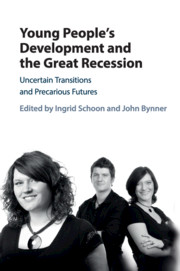Book contents
- Frontmatter
- Contents
- List of Figures
- List of Tables
- Contributors
- Acknowledgments
- Preface
- List of Abbreviations
- Part I Introduction
- Part II The Changing Context of Youth Transitions
- Part III Variations in Education and Employment Transitions during Times of Economic Hardship
- Part IV The Impact of the Great Recession on Families
- 10 Transitioning to Adulthood in the Wake of the Great Recession: Context and Consequences
- 11 Impact of the Recession on Family Dynamics and Youth Well- Being: Findings from the German Family Panel (Pairfam)
- 12 Employment and Family Transitions: Trends before and after the Great Recession
- Part V Future Orientations and Well-being
- Part VI Conclusion
- Index
- References
10 - Transitioning to Adulthood in the Wake of the Great Recession: Context and Consequences
from Part IV - The Impact of the Great Recession on Families
Published online by Cambridge University Press: 20 October 2017
- Frontmatter
- Contents
- List of Figures
- List of Tables
- Contributors
- Acknowledgments
- Preface
- List of Abbreviations
- Part I Introduction
- Part II The Changing Context of Youth Transitions
- Part III Variations in Education and Employment Transitions during Times of Economic Hardship
- Part IV The Impact of the Great Recession on Families
- 10 Transitioning to Adulthood in the Wake of the Great Recession: Context and Consequences
- 11 Impact of the Recession on Family Dynamics and Youth Well- Being: Findings from the German Family Panel (Pairfam)
- 12 Employment and Family Transitions: Trends before and after the Great Recession
- Part V Future Orientations and Well-being
- Part VI Conclusion
- Index
- References
Summary
Abstract
Over the past thirty years the transition to adulthood has become both more drawn out and more diversified. Young adults are taking longer to complete school, begin careers, get married, and have children, as well as reordering and redefining these milestones. While gradual, these changes nonetheless represent seismic shifts in the demographic landscape of young adulthood. Between 2007 and 2009 a more sudden, but equally drastic shift in the economic landscape of the United States followed in the wake of the Great Recession. This chapter examines the intersection of these long- and short-term events. The context for this examination is young adults’ financial relationships with their families, particularly their parents. We choose this framework for two reasons: First, to the extent that young adults are modifying or delaying the transition to even moderate economic self-sufficiency, they must be obtaining support from other sources. Second, to the extent that families have provided this support, the Great Recession is likely to have affected young adults’ need for additional support and parents’ ability to provide it. To these ends, we first use the Monitoring the Future Study to show how parental financial support provided to young adult children over time tracks very closely with the most prominent changes in the transition to adulthood. Then, using the Panel Study of Income Dynamics we show how young adults’ economic circumstances were impacted by the recession and how their families responded.
Introduction: Seismic Shifts Sudden and Gradual – The Great Recession and the Transition to Adulthood
In the United States, the Great Recession altered the economic landscape. The period of negative economic growth that lasted from December 2007 to June 2009 was the longest since the Great Depression. It was also in many ways the most severe, especially with respect to employment: roughly 7.5 million jobs were lost between May 2007 and October 2009, more than doubling the national unemployment rate from 4.4 percent to 10.1 percent. Moreover, by 2010, 40 percent of the remaining unemployed had been out of work for six months or longer.
- Type
- Chapter
- Information
- Young People's Development and the Great RecessionUncertain Transitions and Precarious Futures, pp. 235 - 268Publisher: Cambridge University PressPrint publication year: 2017
References
- 5
- Cited by



